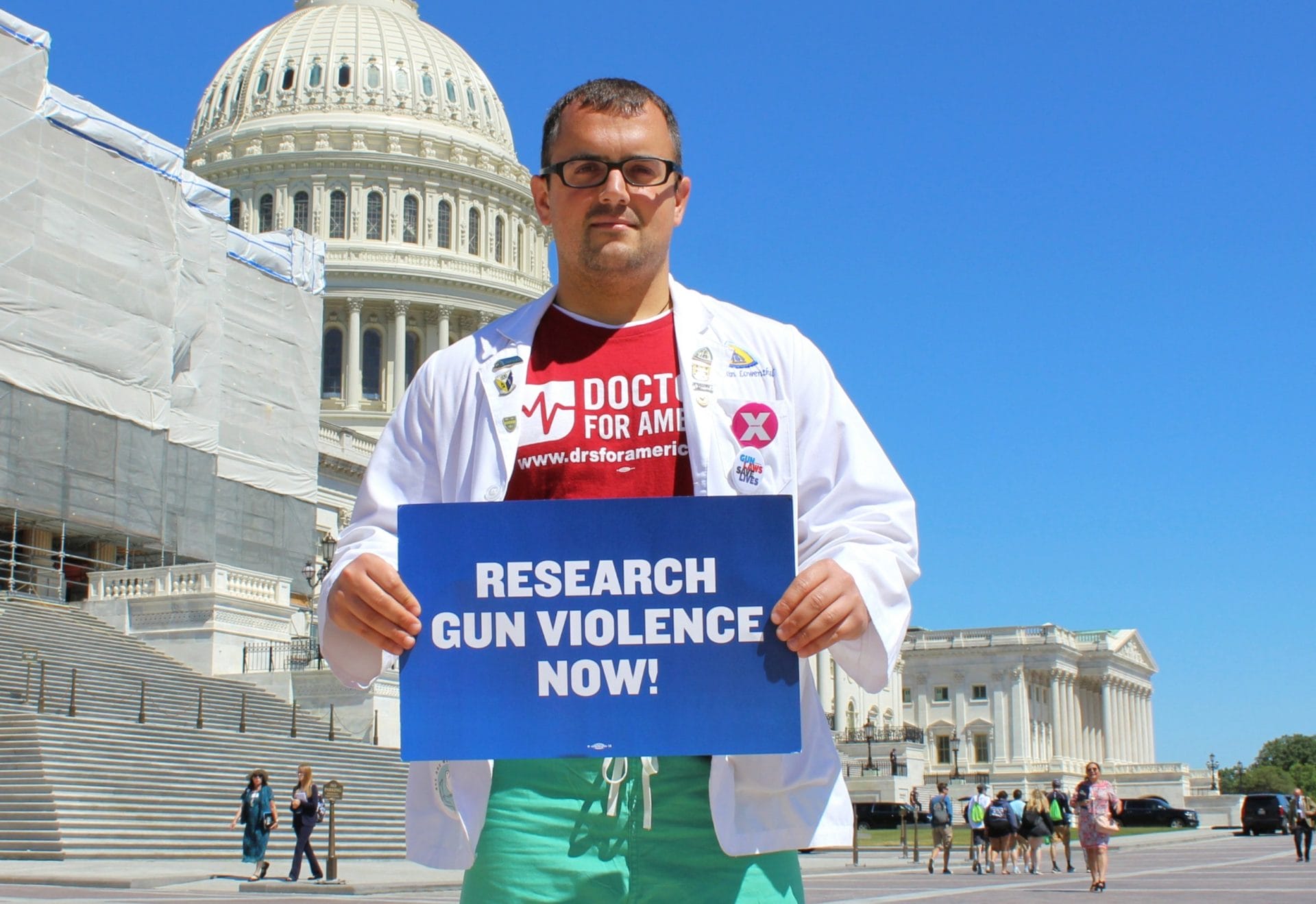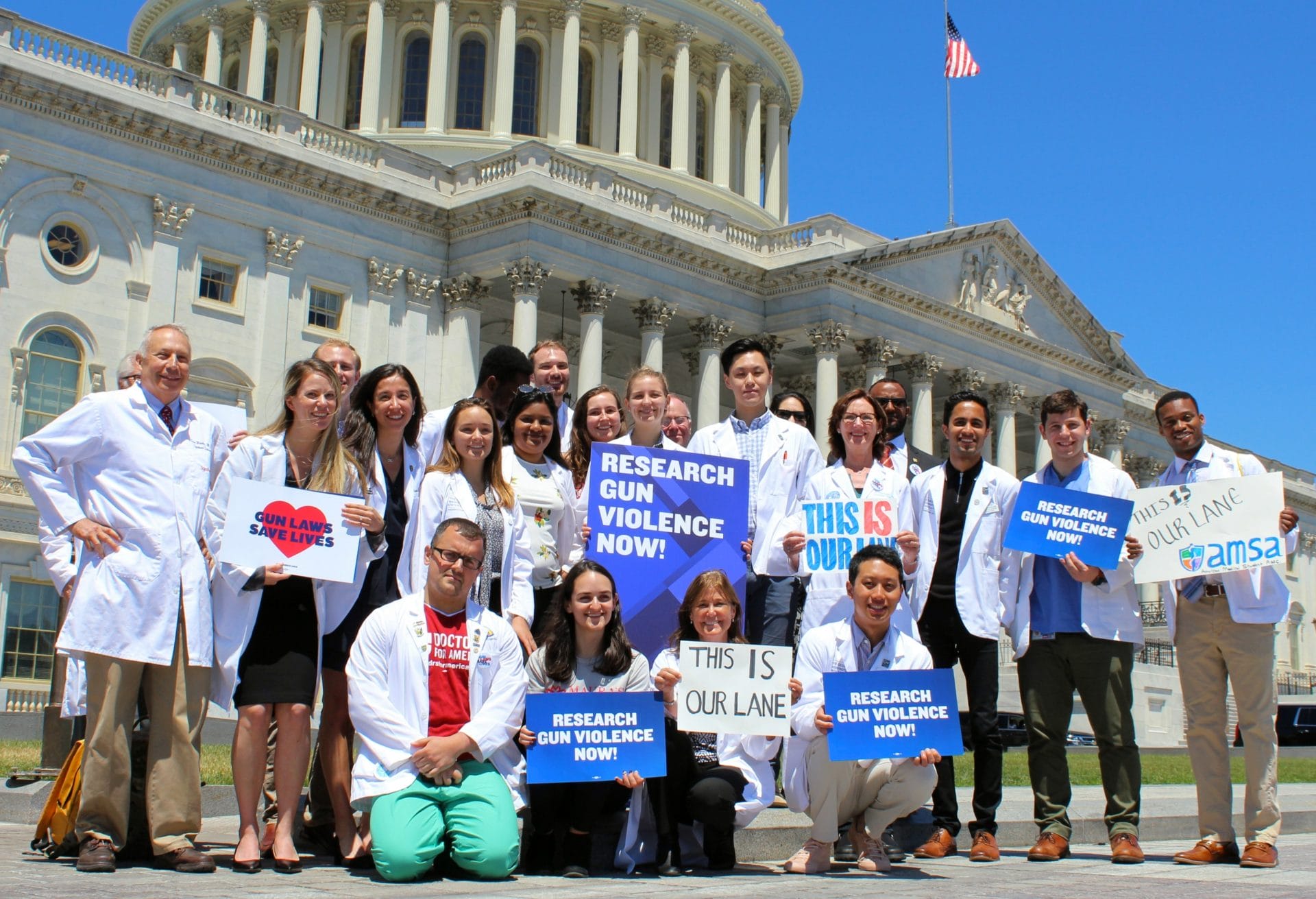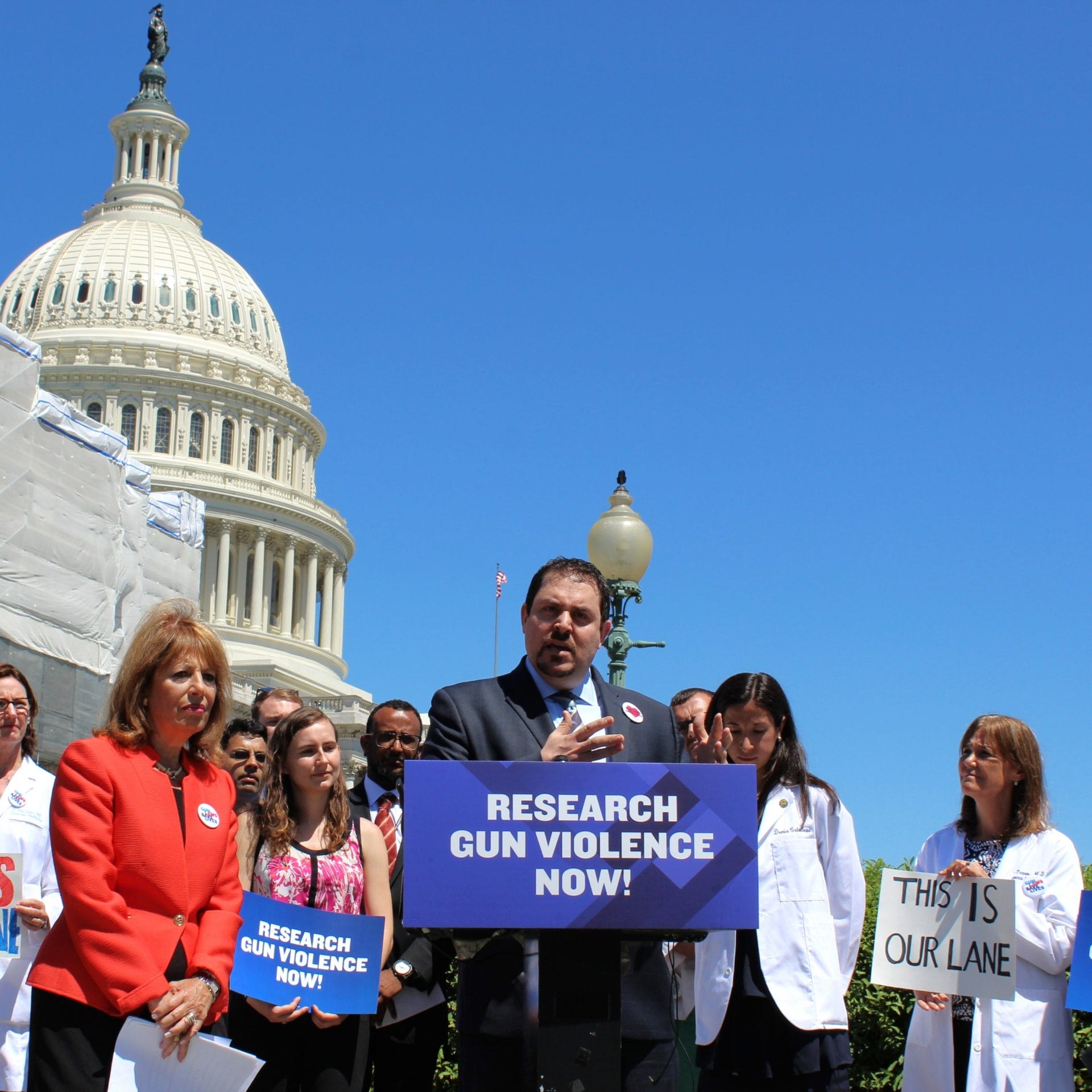
Doctors for Safety: Research Gun Violence Now!
“As guardians of health and wellbeing, the medical community has a responsibility to address gun violence.”
Fighting gun violence is the mission of our partner SAFE: Scrubs Addressing the Firearms Epidemic. Yesterday, we joined them in front of the US Capitol, along with doctors, nurses, and medical professionals to call on Congress to fund gun violence research after decades of inaction.
Our country has conducted research and taken decisive action on a number of other public health and safety threats, from smoking to automobile accidents. It’s time to do the same for gun violence.
The timing couldn’t be more urgent. This week, the House of Representatives is poised to pass a budget bill with $50 million allocated to gun violence research at the CDC and the NIH. This is a big deal—federal funding for gun violence research has been blocked by gun lobby-backed politicians for over 20 years while this public safety crisis has only gotten worse.
[Why We Need to Research Gun Violence]

At the press conference, Representative Jackie Speier—who survived being shot five times 40 years ago—emphasized the huge disparity between the amount of money allocated to gun violence research and other major causes of death. “Public health experts know better than anyone that research into the root causes of health and safety concerns have saved countless American lives,” said Congresswoman Speier.

Congresswoman Rosa DeLauro, chair of the House Appropriations subcommittee responsible for allocating $50 million to gun violence research, also spoke at the press conference. “It’s been twenty years since we’ve been able to do this,” said Congresswoman DeLauro. “None of us are going to give up this fight.”

Congresswomen Speier and DeLauro were joined by Congressman Mike Thompson, chair of the House Gun Violence Prevention Taskforce and a co-sponsor of HR 8, the Bipartisan Background Checks Act, and a number of courageous representatives from SAFE. A few of their powerful stories are below.
Dr. Alex Grossman, MD | ER Resident, Harbor-UCLA Medical Center
“Two months ago, I never thought I would be standing up here,” said Dr. Grossman. Even though her work in emergency medicine had exposed her to the effects of gun violence, its consequences felt distant. “Rarely would my thoughts stray from the medical task at hand.”
This changed after Dr. Grossman’s aunt was murdered in the April synagogue shooting in Poway, California. “Losing a loved one in this way is not like losing someone to disease,” said Dr. Grossman. “A death by gun violence is not natural. It is not peaceful. There is no preparing for it, no getting one’s affairs in order, no chance to say goodbye or ‘I love you’ one last time.”
Dr. Grossman believes she is bound by the Hippocratic oath to prevent the disease of gun violence in our society. She spoke about the helplessness she’s felt since her aunt’s death, knowing that she can’t ease her family’s pain. “As physicians, knowledge is, and always has been our power,” said Dr. Grossman. “We need to use this power to attack gun violence with the same scientific and academic rigor that we use to attack all other epidemics.”
[Pediatricians: “Keep Kids Safe from Gun Violence”]
Dr. Joseph Sakran, MD | Assistant Professor of Surgery, Johns Hopkins University
Dr. Sakran survived a gunshot to the throat at the age of 17. Today he’s a trauma surgeon at Johns Hopkins University who spoke about the difficulty of having to tell families that their loved one has been lost to gun violence. Dr. Sakran founded #ThisIsOurLane in response to the NRA’s attempts to bully doctors from speaking out against gun violence. He’s ensured their voices won’t be silenced.
“Make no mistake about it,” Dr. Sakran said.

“This is a public health crisis that we are facing in this country. This is not a Democratic issue. It’s not a Republican issue. It’s a uniquely American issue.”
The mass shootings that devastate our nation comprise a small percentage of annual gun deaths, Dr. Sakran stressed. “Every day we have young black men that are being killed in cities like Baltimore, Chicago, Philadelphia—and their stories often go untold. So this is much greater than simply the mass shootings that we’re seeing.”
In the past, the medical community has approached similar public health threats by conducting comprehensive research into how best to solve the problem—which is exactly what’s needed today with gun violence. “We didn’t get rid of cars,” Dr. Sakran said, “we came up with alternatives like seatbelts and airbags and we made roads safer. And it’s that same approach that is going to be required to reduce firearm injury and death in America.”
Dr. Roger Mitchell, MD | Chief Medical Examiner, Washington, DC
Dr. Roger Mitchell, DC’s chief medical examiner, has performed hundreds of autopsies on gun violence victims. We shouldn’t treat gun violence differently than any other public health issue, said Dr. Mitchell, and the right people to lead the way are those who spend their professional careers dealing with the devastating aftermath of the epidemic: the medical community.
“We didn’t allow HIV/AIDS to go without a national comprehensive strategy,” said Dr. Mitchell. “We didn’t allow motor vehicle accidents to go without a national comprehensive strategy. We would have never allowed cancer to go without a national comprehensive strategy. And now, in the midst of the opioid crisis…we are developing a national comprehensive strategy.”
Gun violence also needs a national comprehensive strategy. Developing this strategy requires allocating adequate federal money to understand the epidemic, and its many causes and solutions. “We need in medicine to move from a reparative care model to a prevention model—all with a lens toward decreasing gun violence,” said Dr. Mitchell.